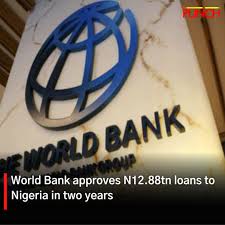The World Bank has approved a total of $8.40bn (about N12.89tn) in fresh loans to Nigeria within the last two years. The new approvals, which span from June 2023 to August 2025, cover 15 projects in key areas such as energy, education, healthcare, rural infrastructure, and governance.
According to figures obtained from the bank’s official website, the funds include $1.95bn (N2.99tn) from the International Bank for Reconstruction and Development (IBRD) and $6.50bn (N9.98tn) from the International Development Association (IDA). The exchange rate used was the official N1,535.93/$ as of Monday, August 11, 2025.
The IBRD provides loans on commercial or near-commercial terms to middle-income and creditworthy low-income countries, while the IDA offers highly concessional loans and grants to the poorest nations. Nigeria also received $122.19m (N187.56bn) in grants for two projects.
In its latest announcement, the World Bank confirmed the approval of a $300m (N460.78bn) loan on August 7, 2025, for the Solutions for the Internally Displaced and Host Communities Project (SOLID Project). The project aims to strengthen resilience and expand access to essential services for Internally Displaced Persons (IDPs) and their host communities in Northern Nigeria. It is expected to benefit up to 7.4 million people, including 1.3 million IDPs, through an integrated development strategy aligned with Nigeria’s long-term growth plans.
Matthew Verghis, World Bank Country Director for Nigeria, said the initiative would help address the development challenges linked to long-term displacement. “The project’s integrated approach, aligned with the National IDP Policy and the Federal Government’s long-term vision, will ensure that IDPs and host communities can transition from humanitarian assistance to self-reliance and resilience, opening up better economic opportunities,” he said.
The World Bank noted that the SOLID Project would build on previous interventions, including the Multi-Sectoral Crisis Recovery Project, and would involve all tiers of government as well as international stakeholders.
Some of the largest loan approvals in the last two years were recorded on June 13, 2024, when the Bank approved $750m (N1.15tn) each for the Nigeria Reforms for Economic Stabilization to Enable Transformation Development Policy Financing and the NG Accelerating Resource Mobilisation Reforms Programme-for-Results. Another $750m (N1.15tn) was cleared in December 2023 for the Nigeria Distributed Access through Renewable Energy Scale-up Project to improve access to clean, reliable electricity.
The education sector also received significant funding, including $700m (N1.07tn) in September 2023 for the Adolescent Girls Initiative for Learning and Empowerment, and $500m (N767.97bn) in March 2025 for the HOPE for Quality Basic Education for All Project.
Healthcare programmes got $500m (N767.97bn) each in September 2024 for the Primary Healthcare Provision Strengthening Program and the Human Capital Opportunities for Prosperity and Equity Governance Project. In March 2025, $80m (N122.88bn) was approved for the Accelerating Nutrition Results in Nigeria 2.0 Project.
Infrastructure-related loans include $500m (N767.97bn) for the Rural Access and Agricultural Marketing Project – Scale Up, and another $500m (N767.97bn) in March 2025 for the Nigeria Community Action for Resilience and Economic Stimulus Program.
Nigeria expects approval of three more loans and a grant before the end of 2025, which could raise total commitments between June 2023 and December 2025 to $9.65bn (N14.82tn). These include the $250m (N383.98bn) Health Security Program in Western and Central Africa – Phase III, $500m (N767.97bn) for the Building Resilient Digital Infrastructure for Growth Project, and $500m (N767.97bn) for the Nigeria Sustainable Agricultural Value-Chains for Growth Project. A $10.5m (N16.12bn) technical assistance grant for the Central Bank of Nigeria is also in the pipeline.
Economists have expressed mixed feelings about the rising borrowing. Adewale Abimbola, a Lagos-based economist, said loans from the World Bank are often concessionary and could be beneficial if tied to viable projects with medium-term revenue prospects. However, Dr Aliyu Ilias, CEO of CSA Advisory, warned that Nigeria’s debt profile is growing too fast, noting that total debt rose from N87tn at the end of the Buhari administration to around N149tn under President Bola Tinubu, with fears it could reach N180tn.
Dr Muda Yusuf, CEO of the Centre for the Promotion of Private Enterprise, said debt sustainability should be the priority. He warned that without stronger revenues, Nigeria risks a debt trap where it borrows to repay existing loans.
Figures from the Debt Management Office (DMO) show Nigeria’s debt to the World Bank rose to $18.23bn as of March 31, 2025, representing 39.7% of the country’s total external debt stock of $45.98bn. The World Bank now accounts for over 81% of Nigeria’s total multilateral debt.
Analysts say while borrowing can drive development if well-managed, Nigeria must ensure that every loan translates to real economic growth, improved infrastructure, and stronger public services, to avoid long-term fiscal distress.
